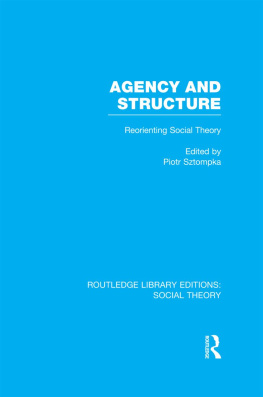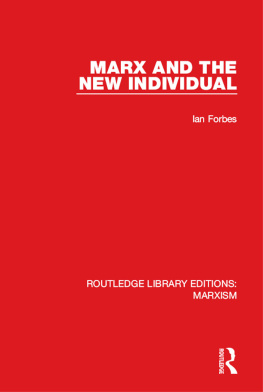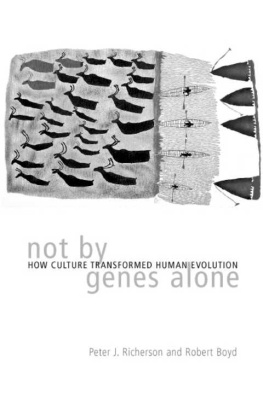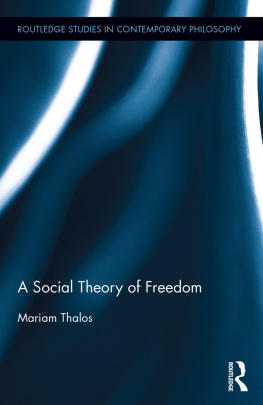Complex Life: Nonmodernity and the Emergence of Cognition and Culture
First published 2000 by Ashgate Publishing
Reissued 2019 by Routledge
2 Park Square, Milton Park, Abingdon, Oxon, OX1 4 4RN
52 Vanderbilt Avenue, New York, NY 10017
Routledge is an imprint of the Taylor & Francis Group, an informa business
Copyright Alan Dean 2000
All rights reserved. No part of this book may be reprinted or reproduced or utilised in any form or by any electronic, mechanical, or other means, now known or hereafter invented, including photocopying and recording, or in any information storage or retrieval system, without permission in writing from the publishers.
Notice:
Product or corporate names may be trademarks or registered trademarks, and are used only for identification and explanation without intent to infringe.
Publishers Note
The publisher has gone to great lengths to ensure the quality of this reprint but points out that some imperfections in the original copies may be apparent.
Disclaimer
The publisher has made every effort to trace copyright holders and welcomes correspondence from those they have been unable to contact.
A Library of Congress record exists under LC control number:
ISBN 13: 978-1-138-70029-1 (hbk)
ISBN 13: 978-1-315-20484-0 (ebk)
First of all my thanks go to Mitzi Wakefield for her everlasting patience, encouragement and support. Thanks also to Mark Johnson for timely advice on material culture and the tangled web of human agency, and to all my colleagues in the Department of Sociology and Social Anthropology at Hull University. I am grateful to Stella Richards for keeping many administrative demands at bay during a busy academic year. Particular thanks also to Larry Harrison, Jo Wild and Adrian James. Finally, I am indebted to Susan Whitlock for providing invaluable feedback and guidance during the early stages of writing this book.
This book comprises a series of chapters that span ideas relating to human origins, the nature of mind and human agency. As substantive areas there is nothing new in this as considerable empirical and theoretical research has been devoted to these topics over the years. What is perhaps less usual is the fact that a commentary on each of these should appear in the same text as an integrated analysis. Academic research is structured in the main on a disciplinary basis. Each group of social scientists have their own primary focus. Generally it is very unlikely that a social theorist would comment on, say, the classification of human fossil remains, or a phenomenologist pass judgment on some early feature of Australopithecus morphology. Similarly, biologist are not routinely given to cultural analyses nor social anthropologist to commentaries on the evolution of the brain. Each group makes its own contribution to our improving knowledge of ourselves, both individually and collectively.
This has been the way the sciences that relate to human life have been structured for many years, and it is a foolish person who has in the past sought to pass comment on developments in a field outside their own. Of course this is understandable to a marked degree because the vast body of research that comprises a field of knowledge is such that few, if any, would have the time to become an expert in more than one disciplinary area. The number of academic journals seems to increase year by year, as does the volume of books available on any academic subject. Thus, the limited disciplinary focus of most research is not only understandable, but an almost inevitable outcome of continuous improvements in research output. However, the fact that the disciplinary structure of academic life is understandable does not mean that it may not be a limiting factor in the generation of new ideas. Viewing human nature from just one perspective ineyitably restricts the range of ideas that can be considered. There is no doubt that human life is cultural, but it is also biological. Our mental life may be reducible in some degree to individual psychology, but it is also linguistic and thus collective. What can be said about human life from within the boundaries of any one discipline will comprise only a limited selection of the whole, and consequently differing theoretical positions may become to be based on seemingly irreconcilable differences. For example, within evolutionary anthropology and psychology Darwinian natural selection theory holds centre stage in any analysis. In a similarly focused way, poststructuralist social theory is grounded on a particular position regarding the division of nature and culture within human agency. Poststructuralists hold that discourse is transcendent over nature as an agent within human affairs, a position that has stemmed from the general postmodern social theoretical interest in unveiling the contingent and discontinuous character of social and cultural life.
It is understandable that the social sciences have developed in this way given the different focus of each approach. Asking a Foucaldian to reflect upon Darwins contribution to the human sciences is unlikely to produce a helpful response given that the starting point of their analysis can be found in reflections on power and discourse. Nevertheless, there is a need to find a paradigm that may provide some theoretical bridge between disciplines if limitations within respective fields are to be addressed. Within this book discussion will reveal some of these limitations, such as Foucaults problem with the nature of the subject, the postmodernist rejection of objective knowledge when confronted with contingency and unpredictability, and the lack of evidence of an engagement with human agency on the part of physical anthropology. The attempt within the book is not to answer all such questions, but rather to show how some new approaches in social theory may help disciplines to develop a dialogue richer in scope than the more usual examples of multi-disciplinary work, characterised as it often is by the lack of an integrated framework and a consequent production of abstracted statements about data.
By a new approach I have in mind the increasing attempts to apply complexity theory to the social sciences. Complexity theory can show how contingency, turbulence, unpredictability and nonlinearity in day-to-day life does not stem from the discursive character of human agency, but is instead a feature of the operation of complex systems. Contingency does not mean the end of objectivity, just the separation of this from predictability. Complexity theory shows that just because something is determined it does not mean that outcomes can be predicted in advance. I also have in mind developments in what is becoming to be known as nonmodern social theory. I think it correct to attribute the first use of this term to the work of Bruno Latour, but others are now seeing the usefulness of this approach and beginning to use it as a critique of both modern and postmodern social theory. Nonmodern social theory is grounded in the idea that nature and culture are inseparable. Modernity never conquered nature, nor was it transcended within the postmodern world. As Latour has argued, the human world is otherwise infused with elements that are hybrids of nature and culture (Latour 1993). Complexity theory sits well with nonmodern social theory because it too is based upon the indivisibility of the constituent parts of a system. Within complexity theory what happens at the surface, macro level is seen to be an emergent outcome of great interconnectivity between constituent elements within the system. And for human agency this means interconnectivity between biology, mind, culture and environment.







